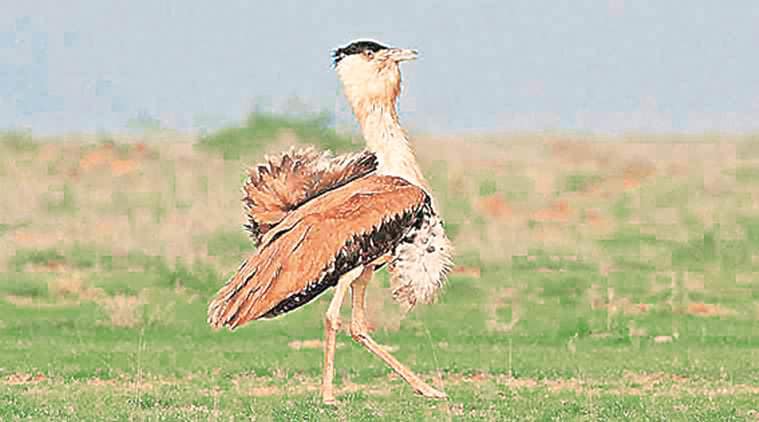Stay updated with the latest - Click here to follow us on Instagram
CMS COP 13: GIB, mainland Asian elephant and Bengal florican get global protection
The other seven species which got listed on the appendices of the CMS include jaguar, little bustard, antipodean albatross, oceanic white-tip shark, urial, smooth hammerhead shark and the tope shark.
 India hosted the CMS COP for the first time and with that, also formally assumed the role of CMS Presidency for the next three years.
India hosted the CMS COP for the first time and with that, also formally assumed the role of CMS Presidency for the next three years.
The 13th Conference of Parties to the Convention on the Conservation of Migratory Species of Wild Animals (CMS COP13) concluded here with listing of total 10 migratory species of the world on Appendix I & II of the convention along with adoption of a number of resolutions and decisions to address the needs and threats facing migratory species around the globe. Three of the species listed are from India – great Indian bustard, mainland Asian elephant and Bengal florican.
The other seven species which got listed on the appendices of the CMS include jaguar, little bustard, antipodean albatross, oceanic white-tip shark, urial, smooth hammerhead shark and the tope shark. The Convention also agreed upon concerted and targeted conservation plans for 14 other species.
India hosted the CMS COP for the first time and with that, also formally assumed the role of CMS Presidency for the next three years. The theme of the COP13 was, “Migratory species connect the planet and together we welcome them home!”
In the closing press conference of COP13, India expressed a strong resolve to recover the population of GIB which is on the brink of extinction with only around 150 birds left in the country.
The other range country of this critically endangered bird and a party to the CMS, Pakistan, remained absent from the event. Alleged hunting of GIB in Pakistan is believed to be one of the reasons for the plummeting numbers of the bird species.
Minister of State for Environment, Forest and Climate Change Babul Supriyo said, “GIB is one bird which is facing very severe threat of extinction. And we are worried about the killing and poaching on the other side of the border, Pakistan. As you know that the GIB has been included in Appendix I, so all the parties who are party of CMS are obligated and it is mandatory for them to follow the rules and regulations…We all work together to ensure that all the countries, including Pakistan, do the necessary to save GIB.”
Inspector General of Forests (wildlife), Ministry of Environment, Forest & Climate Change Soumitra Dasgupta said, “GIB is a big question, internationally. And specially for India…So, India would do anything for conservation of this species…”
Mentioning the Indian government’s efforts for conservation of GIB, Dasgupta said, “There are scientific reports that the birds do fly to Pakistan. So, we need to ensure that the species receives equal protection, that we are providing in India, in the neighbouring country to which the GIB flies; so that the bird’s number starts increasing and one day we can say that the GIB is out of endangerment.”
Total 130 countries of the world are party to the Convention and the COP13 held at Gandhinagar was the largest ever.
“CMS COP13 was the largest ever in the history of the Convention, with 2,550 people attending including 263 delegates representing 82 Parties, 11 delegates from 5 non-Party countries, 50 representatives from the United Nations agencies, 70 representatives of international NGOs, 127 representatives of national NGOs and over 100 members of both national and international media,” said a release from the CMS secretariat.
As per CMS, despite the listing and consequent efforts, 73% of 175 migratory species listed on Appendix-I and 48% of the 518 on Appendix-II have an overall decreasing population trend.
In an apparent reference to this, the release quoted Executive Secretary of CMS Amy Fraenkel as saying, “The initial status report has been a real wake up call for the Convention, and Parties recognised, the importance of a more thorough analysis. CMS COP13 has given a clear mandate to prepare a flagship report on the status of migratory species which will give us a better idea of what is happening on the ground, and also provide a much needed tool for understanding where we need to focus our work.”
The COP13 witnessed a number of proposals and resolutions passed following debate over the same by party countries.
Among issues that divided countries at the COP13 was a proposal moved by the CMS secretariat to put additional restrictions on countries whose financial contributions are three or more year in arrears.
The secretariat proposed to deny parties in arrears the right to submit reports and proposals for listing of species on CMS Indices. However, Brazil led the opposition to this proposal successfully, convincing the European Union and other countries like Israel, Australia, New Zealand etc. to withdraw their support to the proposal.
“In the negotiations, we said that we are not against restrictions per say. But the denial of rights to submit proposals for listing of species on CMS Indices would punish the species that require attention rather than the countries which are in arrears. For example, if Brazil is in arrears, you may like to punish the country. But if the hammerhead shark requires attention of the CMS and listing on Indices and if Brazil is denied to submit proposal, it will be a punishment to the species. Therefore, we said that the proposal of additional restrictions goes against the core mandate of the CMS. Had that proposal gone through, 20 per cent of the Parties would have lost rights,” Igor Vidal, an officer of the Brazilian Ministry of Foreign Affairs and a delegate at the COP13 told The Indian Express.
Similarly, African countries also persuaded other Parties to not adopt another proposal of the CMS secretariat to introduce a framework of mandatory minimum financial contributions from Parties, stating that this would lead to huge increase in financial liabilities of countries whose economies are not very strong.
CMC rules mandate that the inter-sessional budget be approved unanimously and there is no provision to put it to vote.
The COP13 also approved budget for inter-sessional period 2020-2023, with a 4.5 per cent increase in the core budget of the Convention. The budget also approved creation of post of an associate programme officer for avian species.







